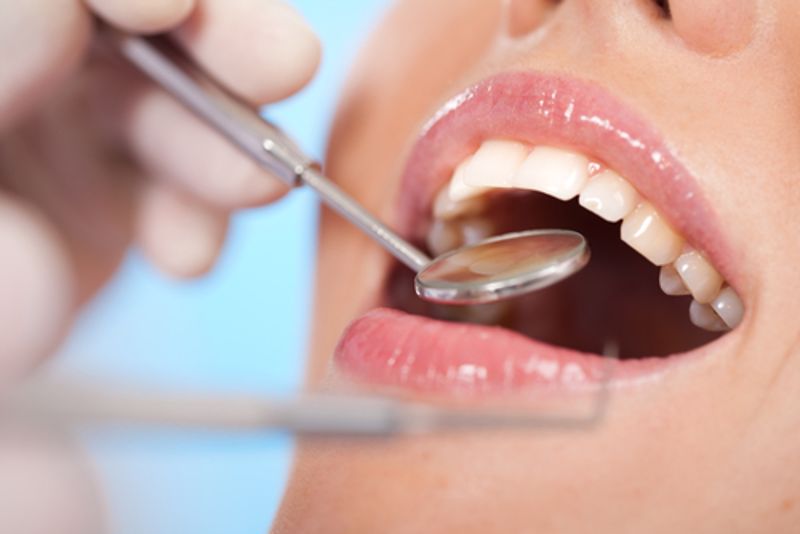Fluoride has been called one of the "10 great public health achievements of the 20th century," and plays a major role in helping modern society achieve better dental health. It is a naturally occurring mineral, found in low levels in virtually all drinking water supplies, as well as most of the foods we eat. As a supplemental therapy, it comes in a number of forms, including toothpaste, fluoridated drinking water and topical treatments.
In this post, we'll review the major benefits of fluoride use.
Cavity prevention
There is very clear evidence to support claims that fluoride can help prevent cavities, especially when it is administered in conjunction with regular dental hygiene and preventative care.
This is particularly true when it is administered systemically, which typically occurs through exposure to fluoridated community drinking water. Systemic fluoride is thought to be most helpful early in life, when teeth are first erupting through the gums. However, it can even help later in life.
The New Zealand Ministry of Health estimates that more than half of children, and up to one-third of adults, do not brush their teeth with recommended fluoride toothpaste twice a day, every day as they are supposed to. In this case, fluoridated drinking water can help pick up the slack and prevent a significant degree of dental decay. Some figures indicate that individuals living in New Zealand cities and towns with fluoridated water experience roughly 40 percent less tooth decay than those living in areas without adjustments to the fluoride level of their drinking water.
Topical fluoride can also be provided to children and adults of all ages, and tends to be particularly effective in repairing the early stages of decay. Forms of topical fluoride include supplemented toothpastes, as well as leave-on treatments that can be done either at the dentists' office or at home.

Safety
Fluoride is naturally occurring in low levels in our drinking water as well as many foods. It has a well-established safety profile and has been extensively used as a supplement in public drinking water around the globe throughout the past century. The use of fluoridated drinking water is endorsed by virtually all major public health agencies, from the New Zealand Ministry of Health to the Australian, British and American Dental Associations, United States Centers for Disease Control and Prevention and last but not least, the World Health Organization.
Some critics have cited reports that excessive intake of fluoride can cause dental and skeletal fluorosis, which typically results from chronic exposure to moderate or high levels of fluoride. Features of dental fluorosis can mimic damage from other issues, such as malnutrition, and include staining and pitting of the tooth enamel. Skeletal fluorosis can involve joint pain and stiffness, as well as eventual changes in bone structure and calcification of tendons. Fluorosis of either type is very rare, and more likely to occur in areas with drinking water that is naturally high in fluoride. Typically, this would be seen in the world's "fluoride belts," which tend to be areas seated at the foot of tall mountains or places of geologic deposit. Fluoride belts have been identified in parts of northern Africa and the Middle East, as well as northern Thailand, China, Japan and parts of the Americas. Fluorosis has been reported in these areas. However, the number of cases seen in the world's fluoride belts is definitely shadowed by the vast benefit to dental health seen in most of the rest of the world.
On premise, optimizing fluoride levels in drinking water is not much different than adding iodine to table salt, vitamin D to dairy products, or folic acid to bread products. These additions prevent health issues that sadly remain widely seen in developing nations, including thyroid goiter, rickets and neural tube defects in newborns, respectively. These conditions, as well as tooth decay, are in large part preventable through public health endeavors.
Economics
Fluoride treatments are an inexpensive way to potentially prevent very expensive dental issues down the line. The American Dental Association website cites data that shows every $1 spent on fluoridated drinking water prevents approximately $38 of dental treatment costs. In fact, it costs less to fluoridate city drinking water for an individual's entire lifespan than it does to put in a single dental filling. That's a very economical solution!
Whether delivered systemically in fluoridated drinking water, or topically via toothpaste and painted-on treatments, fluoride is your friend. It is convenient, safe, economical and tremendously helpful in preventing dental decay. As part of a dental health regimen that includes regular brushing and flossing, avoidance of sugary drinks and snacks, as well as annual visits to the dentist, fluoride can help you achieve your dental health goals.
To learn more about keeping your teeth healthy, or to get your teeth checked, contact the experienced team at City Dentists.
